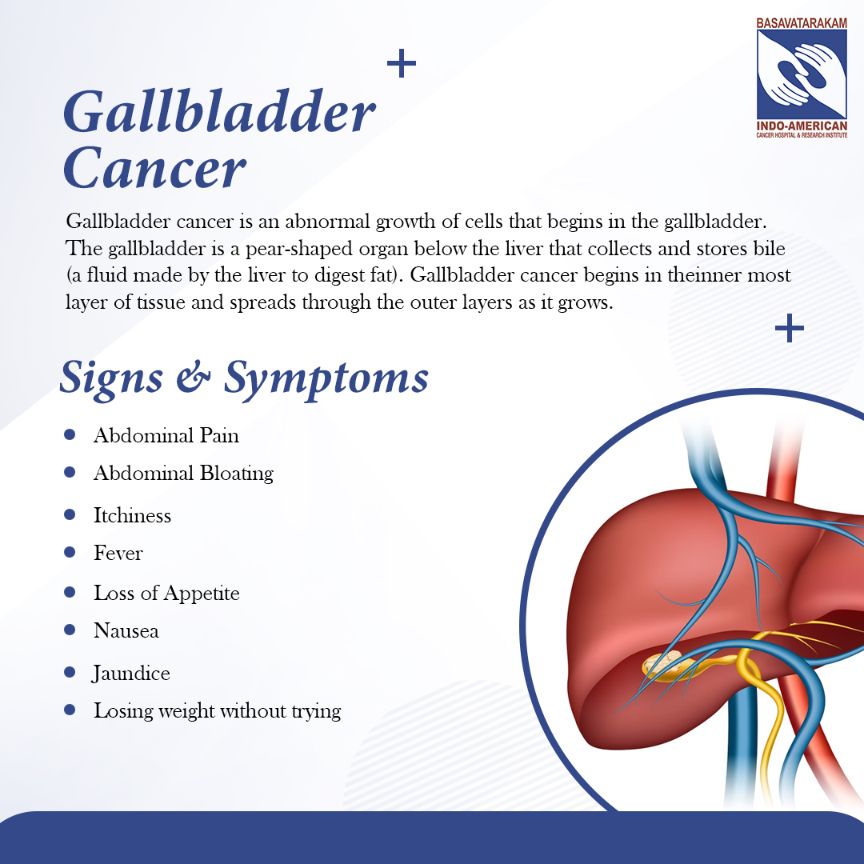

Gallbladder cancer is a rare form of cancer that starts in the cells of the gallbladder, a small organ located beneath the liver. It is difficult to detect in its early stages, and as a result, it is often diagnosed at an advanced stage.

Causes of Gallbladder cancer:
The exact cause of gallbladder cancer is not known, but there are several factors that may increase the risk of developing this disease. These include:
Being female: Women are twice as likely as men to develop gallbladder cancer.
Having a history of gallstones: Gallstones are hardened deposits of digestive fluid that can form in the gallbladder. They can cause inflammation and irritation, which may increase the risk of developing cancer.
Having a family history of the disease: If someone in your family has had gallbladder cancer, your risk of developing the disease may be higher.
Having certain genetic mutations: Some inherited genetic mutations, such as Lynch syndrome, can increase the risk of developing gallbladder cancer.

Signs and Symptoms of Gallbladder cancer:
Gallbladder cancer may not cause any symptoms in its early stages. However, as the cancer grows, it may cause the following signs and symptoms:
Abdominal pain: This is the most common symptom of gallbladder cancer. The pain may be dull or sharp and may be felt in the upper right portion of the abdomen or in the back.
Jaundice: This is a yellowing of the skin and eyes that occurs when the liver is not functioning properly. Gallbladder cancer may cause a blockage in the bile duct, which can lead to jaundice.
Fever: A fever is a common sign of inflammation or infection in the body. Gallbladder cancer may cause a fever if it has spread to other parts of the body.
Nausea and vomiting: These symptoms may occur if the cancer is causing a blockage in the digestive system.
Unexplained weight loss: If you are losing weight without trying, it could be a sign of gallbladder cancer.

Gallbladder cancer Treatment Options:
Treatment options for gallbladder cancer depend on the stage of the disease and other factors, such as the patient’s overall health. Treatment may include surgery, chemotherapy, radiation therapy, and targeted therapy.
Surgery is the most common treatment for gallbladder cancer. The type of surgery will depend on the stage of the cancer and the location of the tumor. In some cases, the entire gallbladder may need to be removed. In more advanced cases, other organs may need to be removed as well.
Chemotherapy uses drugs to kill cancer cells. It may be used before or after surgery, or it may be used as the primary treatment if surgery is not an option.
Radiation therapy uses high-energy beams to kill cancer cells. It may be used before or after surgery, or it may be used as the primary treatment if surgery is not an option.
Targeted therapy uses drugs that target specific proteins or other molecules that are involved in the growth and spread of cancer cells.
Conclusion:
Gallbladder cancer is a rare form of cancer that can be difficult to detect in its early stages. If you are experiencing any symptoms, it’s important to speak with your doctor. Early detection is key to improving outcomes. If you or someone you know has been diagnosed with gallbladder cancer, it’s important to work with a medical professional to develop a personalized treatment plan.
Best Cancer Hospital to treat Gallbladder cancer is Basavatarakam Indo American Cancer hospital
Basavatarakam Indo American Cancer Hospital is a well-known cancer center in India that provides comprehensive cancer care to patients. Our hospital has a team of experienced medical professionals including surgical, medical, and radiation oncologists, as well as other specialists such as pathologists, radiologists, and palliative care physicians.
The hospital also has state-of-the-art technology and infrastructure to provide advanced cancer treatments including radiation therapy, chemotherapy, targeted therapy, and immunotherapy. Additionally, We have a patient-centric approach and provides a range of support services such as psychological counseling, nutritional counseling, and rehabilitation programs to help patients and their families cope with cancer.
“Did you know that gallbladder cancer is a rare form of cancer that can be difficult to detect in its early stages? While the exact cause of this disease is not known, some factors that may increase your risk include being female, having a history of gallstones, having a family history of the disease, and having certain genetic mutations.
If you’re experiencing abdominal pain, jaundice, fever, nausea, or vomiting, it’s important to speak with your doctor. These could be signs of gallbladder cancer, but they could also be caused by other conditions. Remember, early detection is key to improving outcomes, so don’t hesitate to get checked out.
Help us spread awareness about gallbladder cancer by sharing this post with your friends and family. Together, we can make a difference and support those affected by this disease.”


